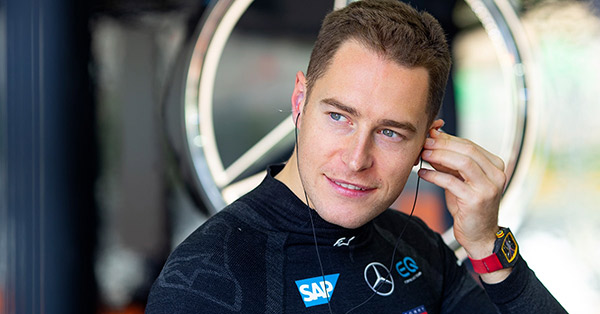Not every global tech company originated in Silicon Valley. SAP, which specializes in cloud and business technology, began life in Germany but now has over 91,000 employees and operates in 174 countries around the world. With such a global workforce, and a huge range of customers, SAP knows that embracing diversity makes business sense.

‘We are a company that is evolving and changing’
Tom Loeffert recently assumed the HRD role for EMEA SAP Concur after serving for 3.5 years as the SAP UK HR Director. He is also gay and originally from New York.
He has over 20 years of HR and business experience, working with household-name companies. He’s been with SAP for five years, and relocated to London to take up up his previous role in November 2014.
He served as a member of the Senior Leadership Team in the UK and also takes on the role executive sponsor of Pride@SAP employee network, which has around 150 members.
Pride@SAP is just one of SAP’s employee networks such as the Business Women’s Network, Early Talent Network and one soon to be launched aimed at the BAME team members in the UK.
Tom says he sees the groups, regardless of their focus, as an extension of the SAP brand. Not only do they provide support for team members, but they also send out a signal about the company; that’s it’s not a traditional European or IT company.
‘We are a company that is evolving and changing, and we are at a different place to people’s perceptions. The employee network groups are a key vehicle to do that. They’re a lamppost by which people can see they can come here and have a successful career.’
Award-winning
For him, SAP is easily one of the best companies he’s worked for in terms of its attitude towards diversity. This has been back up by some of the recent awards it has won: Great Places to Work 2018; Glassdoor Best Places to Work 2018; Top Employer 2018; and EDGE Certified (Gender Equality) 2018.
‘These awards, all in one year, was a transitional point for me to say we have made tremendous strides in both what our employees say about us, and our assessment of ourselves,’ says Tom. ‘That’s a clear sign we have changed the culture and the culture continues to evolve.’
Has he ever worked anywhere that was wasn’t as welcoming of diversity?
‘I spent seven years of my life working at GAP, Inc, in San Francisco, which I probably did seven years of the best work of my career. I look at the past five years at SAP, and for me there’s a correlation and connection between both of those organizations, being able to be who I was, and doing some of the best work of my career. I don’t think it’s a coincidence that those two places are the two longest places I’ve worked’.
‘GAP was also the first time I worked for someone who was LGBTQ, and the second time I worked for an LGBTQ leader was here at SAP. It’s why I’m mentoring people, it’s why I’m trying to be out there as a voice for the organization.’
‘I recognise the importance that people need to be able to look up in an organization and see people who are like them, to make them believe that they can actually aspire to be greater than they believe themselves to be.’
Not all companies work this way
‘But have there been places I thought that I couldn’t be me? I would say at the beginning of my career, 23 years ago, it’s not that I couldn’t be me, but you wore a mask, and I think that was true of a lot of people regardless of who you were. You’re expected to be a certain way, to look a certain way, to adhere to the culture.’
Tom says that at one company he worked for, which he politely declines to name, where he feels bias, unconscious or otherwise, might have been held against him. And in a company regarded as being a champion of diversity in its industry:
‘I was told if you want to move forward and become a director, you need to go negotiate a labour contract. That involved moving from Chicago, Illinois to a very small town in either Iowa or Pennsylvania.’
‘I began the process and got amazing feedback, but then came the “but.” And the “but” was they had “concerns” over someone like me going and interacting with different types of people who work in a plant in a small town.
‘Now, how they defined these concerns was seemingly rationale. Do I think that was related to the fact I’m gay? I don’t know, but it’s the one moment of my career that gives me pause to think that perhaps it was.’
‘And then I moved to California and that’s when I went to work for Cisco Systems, and the story rights itself from there. Moving to California, and San Francisco in particular, it freed me to become what I was meant to be, and working in a city like that, and in an environment where you can be who you want to be, finally freed me to become the leader I am today.’
Advice for those wanting to advance their careers
Finally, would he have advice for anyone who is just setting out on their own career path?
‘As best you can, have a plan. I know that’s very hard when you’re young, but I was very fortunate when young to realize the kind of life I wanted to have, the kind of career I wanted to have, and to thoughtfully make choices that helped me to achieve that.
‘I’ve come to learn most people don’t always have that clarity, and having a plan also requires trade offs, but the sooner you can get a sense of a framework of how you want to develop as a person and a professional, and you can marry the two of those together, that’s when you’ll fulfil yourself.’
‘Define the kind of organizations that will allow you to be the full you and bring the full weight of who you are to that job. You will only do your best work when you can bring the full weight of your humanity, your full self to it.
‘And I would say it’s incredibly important to find people who will support and champion you and your efforts. There are mentors, there are sponsors, and there’s your boss.’
‘You should always expect to work for someone who cares about you and makes you believe you can do things you did not think possible”






